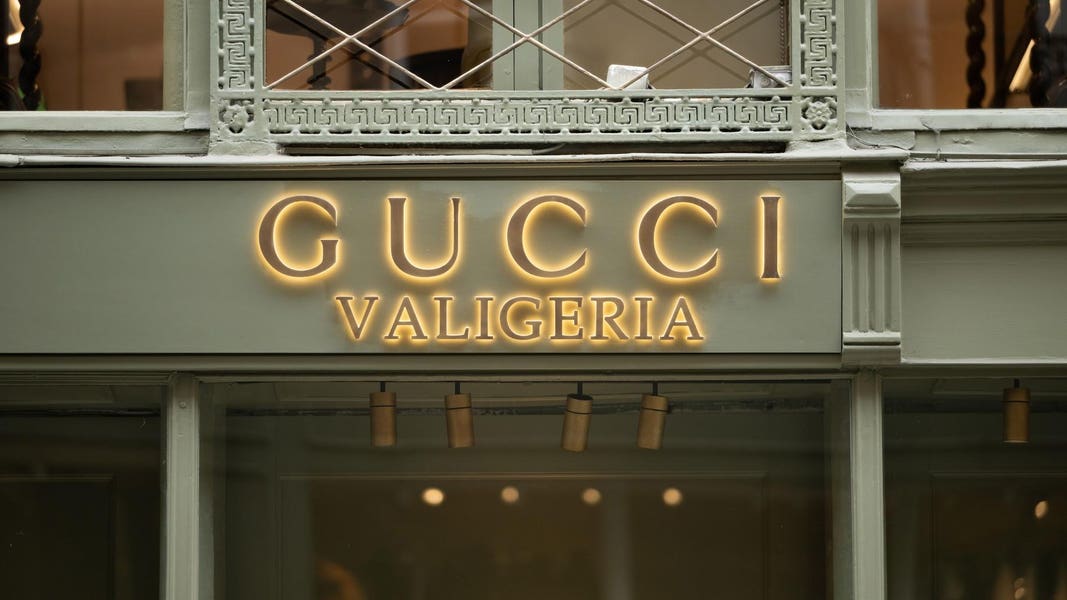
Topline
French conglomerate Kering—owner of Gucci, Yves Saint Laurent, Bottega Veneta and other luxury brands—reported on Tuesday a 10% drop in first-quarter sales, as its star label Gucci faces slowdown in China and undergoes a leadership overhaul.
Key Facts
Kering posted $4.8 billion (€4.5 billion) in sales for the first quarter, down 10% year over year, roughly in line with analyst estimates of $4.8 billion; yet the group anticipates its operating income will drop between 40% to 45% in the first six months.
Gucci, where Kering derives around half of its sales and more than two-thirds of its profits, saw its revenues plunge 18% to $2.2 billion (€2.1 billion) as a slump in the Asia-Pacific region weighed heavily on the Italian fashion house.
With 35% of Kering’s sales hailing from Asia, excluding Japan—a barometer for Chinese demand—the French luxury giant is facing a downturn in China, as consumers have scaled back on purchasing Gucci’s iconic belts and handbags.
In recent years, Gucci has undergone a significant overhaul, which includes adapting to the “quiet luxury” fashion trend—a contrast to Gucci’s long-standing maximalist image—and appointing a new creative director in 2022, followed by a new CEO in 2023.
Bernard Arnault-owned LVMH, the French luxury group behind Louis Vuitton—and Kering’s biggest competitor— reported last week a 3% growth in sales for the first quarter.
Big Number
$8.1 billion (€7.5 billion). That’s approximately the amount erased from Kering’s market value last month following the group’s unexpected—and stark—profit warning on its first-quarter results, dragged down by Gucci. Shares plummeted around 14%, marking their biggest one-day fall since March 2020.
Forbes Valuation
We estimate François Pinault, founder and honorary chairman of Kering, is worth an estimated $27.2 billion and is the world’s 65th richest person. Kering was ranked No. 328 on Forbes’ Global 2000 last year with a roughly $74 billion market value, thanks to a slew of luxury houses it owns, spanning from fashion and leather goods, to jewelry and eyewear.
Key Background
Gucci has struggled with two sector-wide challenges: a downturn in China’s once-booming luxury market and a shift toward “quiet luxury,” marked by subtler and more refined aesthetics. Kering has taken a harder blow from this shift than its luxury peers due to the evolving tastes in the Chinese market. Rather than opting for Gucci’s historically loud, maximalist appeal, consumers started favoring brands like Hermès and Prada for their understated elegance; both have posted strong full-year results for 2023. An increasingly stratified Chinese market also played a part, where the ultra-rich gravitated towards the exclusivity of the Birkin bag maker, while the aspirational consumers—previously the driving force behind Gucci’s success—are now reeling from economic pressures. “The Chinese market is becoming more polarized, which is consistent with Kering’s sales warning about Gucci’s performance in China,” wrote Barclays analysts in a note to clients.
Tangent
Amid significant change, Gucci has embarked on a creative—and leadership—overhaul, which is yet to be successful. With the departure of Gucci’s star designer, Alessandro Michele, in 2022, whose flamboyant designs previously propelled the brand to new heights, the Italian brand appointed Sabato De Sarno as the next creative director. Sarno has embodied the “quiet luxury” trend with a more subdued and minimalist fashion, but its success remains to be seen in China, a market from which it derives more than a third of its sales. “The jury is out on whether the Chinese will like the Sabato De Sarno quiet luxury,” wrote Bernstein analyst Luca Solca in his recent note. Last year, the company replaced former CEO Marco Bizzarri with Kering’s managing director Jean-François Palus—a debated change that “continues to postpone the Gucci revival and risk execution hiccups,” wrote Solca.
